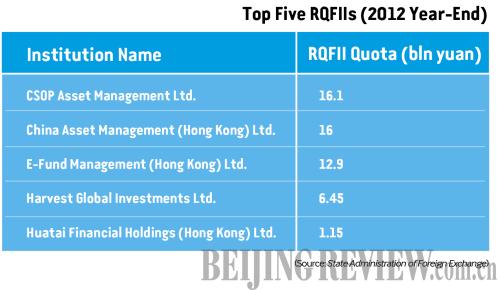|
Taiwan investors are strongly enthusiastic about the mainland's capital market, and many Taiwan institutional investors have invested their renminbi floating assets in the offshore bond market in Hong Kong to purchase RQFII products. Taiwanese investors hope to have 100 billion yuan ($15.92 billion) of separate RQFII quota for Taiwan-funded financial institutions to carry out RQFII business. The mainland has actively replied to such a demand.
Besides the RQFII business in Taiwan, China's central bank authorized the Industrial and Commercial Bank of China's Singapore branch to act as clearance bank for renminbi business in Singapore, offering a new opportunity for Singaporean financial institutions to establish renminbi clearance banks in the country. RQFII business is likely to be launched soon in the city-state.
Dollar still dominates
Renminbi is playing a more and more significant role in the international market. It has been the major reference currency in East Asia. The currencies of seven out of 10 jurisdictions in East Asia, including South Korea, Indonesia, Taiwan, Malaysia, Singapore and Thailand, track renminbi more closely than the U.S. dollar. Some U.S. scholars and talking heads in the media are concerned that an accelerated internationalization of renminbi is threatening the U.S. dollar dominance in the international monetary system.
Li Yang, Vice President of the Chinese Academy of Social Sciences (CASS), thinks the worry is unnecessary because renminbi is unlikely to replace the U.S. dollar as the world's reserve currency in the near future.
According to Li, the international financial system needs multiple reserve currencies. However, convertibility restrictions hinder the progress for renminbi to become an international reserve currency, let alone to challenge the position of the U.S. dollar. At present, most renminbi trade settlement is for China's imports. Since most foreign importers are not willing to pay in renminbi, the currency is seldom used in China's exports. In 2012, foreign trade settled in renminbi accounted for less than 10 percent of the country's total trade volume.
Wei Yanshen, a researcher with the Institute of Asia-Pacific Studies at the CASS, says during the accelerating process of renminbi internationalization, the cross-border trade settlement of renminbi has shown strong growth. However, authorities should be soberly aware of the problems and risks associated with renminbi's internationalization: The yuan is still not well accepted by foreign traders. In trade payment, bond clearance and foreign currency reserves, renminbi still has a long way to go to be a global currency. Moreover, preventing risks in its internationalization and guaranteeing safe economic and financial operations are also important down the renminbi's path to becoming a truly global currency.
Zhang Bin, a researcher at the Institute of World Economics and Politics at the CASS, thinks Hong Kong's offshore renminbi market now faces many obstacles, such as the foreign exchange control and the interest rate system of the mainland. The exchange rate gap between the mainland and Hong Kong has become a main reason leading to the development of the offshore renminbi market. For these reasons, many problems remain before renminbi can become a global currency.

Overseas Renminbi Assets and Flows, 2012
By the end of 2012, the overseas renminbi assets totaled 1.2 trillion yuan ($191.08 billion), 80 percent of which were in Hong Kong.
The balance of renminbi deposits and certificates of deposit in Hong Kong totaled 720.3 billion yuan ($114.7 billion), up by 9 percent from a year ago.
In 2012, China saw 56 billion yuan ($8.92 billion) of funds flow back to the country under the RQFII program.
Email us at: lanxinzhen@bjreview.com | 